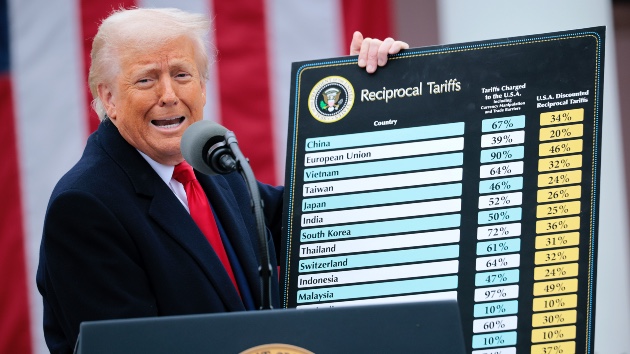
(NEW YORK) — President Donald Trump’s sweeping tariffs are an “unprecedented and unlawful expansion” of executive power, a lawyer for a group of small businesses told a federal court Tuesday morning.
The hearing at the Court of International Trade in Manhattan marks the first time a federal court has taken up the question of whether Trump’s “Liberation Day” tariffs are legal.
According to Jeffrey Schwab – a lawyer from the conservative Liberty Justice Center representing the plaintiffs – the question isn’t even close. Schwab argued that the International Emergency Economic Powers Act – a 1977 law that gives the president the right to regulate commerce during national emergencies – does not give Trump the right to unilaterally to impose tariffs.
He added that Trump’s purported emergency of trade deficits has been a problem for years and fail to meet the legal standard for an emergency of being brief, rare and not ongoing.
“This case is so far outside of what an emergency is and what an unusual and extraordinary threat is that this Court could easily say that it is not an emergency,” Schwab argued.
When the three judge panel hearing the case – including judges appointed by Presidents Obama, Trump and Reagan – pushed for a legal standard on which to issue their future ruling, Schwab said the unlawfulness of the tariffs is so obvious that the judges shouldn’t overthink it.
“I’m asking this court to be an umpire and call a strike, you’re asking me, well, where’s the strike zone? Is it at the knees or slightly below the knees?” Schwab said. “I’m saying it’s a wild pitch and it’s on the other side of the batter and hit the backstop, so we don’t need to debate that.”
The lawsuit was filed last month by a group of small businesses, including a New York liquor distributor, Utah pipe company, Virginia electronics store, Pennsylvania-based tackle shop, and Vermont cycling company. Each company argued they rely on imports from countries like China and Mexico and would be irreparably harmed by what they called Trump’s “unprecedented power grab illegal.”
The small business argue that the International Emergency Economic Powers Act does not give the president the power to unilaterally impose tariffs like Trump did last month with a blanket tariff rate and higher rates for certain countries.
They described the national emergency Trump used to justify the tariffs as a “figment of his own imagination” because the United States has operated with massive trade deficits for years without causing economic harm.
“If actually granted by statute, this power would be an unlawful delegation of legislative power to the executive without any intelligible principle to limit his discretion,” they argued.
Lawyers with the Department of Justice have pushed back on the lawsuit, saying that Congress permits the president to impose some tariffs, and Trump’s invoking of a national emergency makes his power “broader,” justifying the sweeping tariffs. They have also argued that a court order blocking the tariffs would unlawfully encroach on the president’s authority.
“Plaintiffs’ proposed injunction would be an enormous intrusion on the President’s conduct of foreign affairs and efforts to protect national security under IEEPA and the Constitution,” they argued.
At least six separate lawsuits have targeted Trump’s use of tariffs, including a case filed by the state of California and a coalition of twelve state attorneys general. While some of the cases were filed in district courts, the cases have gradually been transferred to the Court of International Trade, making Tuesday’s argument the first time a panel of judges hears a challenge to Trump’s tariffs.
Last month, the court rejected an emergency request for a temporary order to block the tariffs, finding that the businesses failed to prove that an “immediate and irreparable harm” would stem from the tariffs.
Tuesday’s argument will be heard by a panel of three judges – Gary S. Katzmann, Timothy M. Reif, and Jane A. Restani – who were appointed by Presidents Obama, Trump and Reagan respectively.
Tucked away in a corner of New York’s Foley Square, the Court of International Trade has nationwide jurisdiction on trade disputes and has recently focused its energy on more niche issues, like honey customs disputes and mattress imports. Tuesday’s oral argument is set to provide the most high-profile hearing for the court in recent memory.
Copyright © 2025, ABC Audio. All rights reserved.
